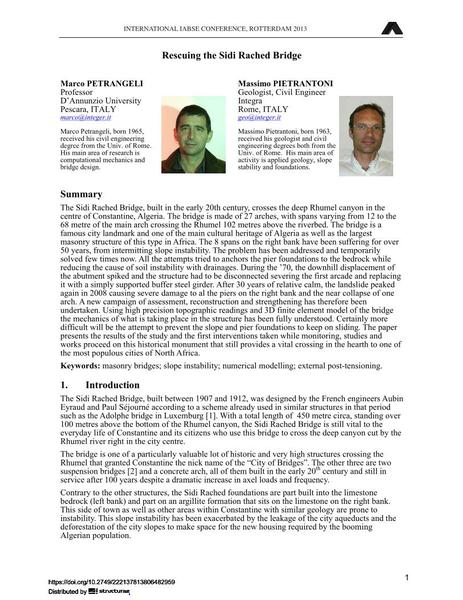Rescuing the Sidi Rached Bridge

|
|
|||||||||||
Bibliografische Angaben
| Autor(en): |
Marco Petrangeli
Massimo Pietrantoni |
||||
|---|---|---|---|---|---|
| Medium: | Tagungsbeitrag | ||||
| Sprache(n): | Englisch | ||||
| Tagung: | IABSE Conference: Assessment, Upgrading and Refurbishment of Infrastructures, Rotterdam, The Netherlands, 6-8 May 2013 | ||||
| Veröffentlicht in: | IABSE Conference, Rotterdam, May 2013 | ||||
|
|||||
| Seite(n): | 186-187 | ||||
| Anzahl der Seiten (im PDF): | 8 | ||||
| Jahr: | 2013 | ||||
| DOI: | 10.2749/222137813806482959 | ||||
| Abstrakt: |
The Sidi Rached Bridge, built in the early 20th century, crosses the deep Rhumel canyon in the centre of Constantine, Algeria. The bridge is made of 27 arches, with spans varying from 12 to the 68 metre of the main arch crossing the Rhumel 102 metres above the riverbed. The bridge is a famous city landmark and one of the main cultural heritage of Algeria as well as the largest masonry structure of this type in Africa. The 8 spans on the right bank have been suffering for over 50 years, from intermitting slope instability. The problem has been addressed and temporarily solved few times now. All the attempts tried to anchors the pier foundations to the bedrock while reducing the cause of soil instability with drainages. During the ’70, the downhill displacement of the abutment spiked and the structure had to be disconnected severing the first arcade and replacing it with a simply supported buffer steel girder. After 30 years of relative calm, the landslide peaked again in 2008 causing severe damage to al the piers on the right bank and the near collapse of one arch. A new campaign of assessment, reconstruction and strengthening has therefore been undertaken. Using high precision topographic readings and 3D finite element model of the bridge the mechanics of what is taking place in the structure has been fully understood. Certainly more difficult will be the attempt to prevent the slope and pier foundations to keep on sliding. The paper presents the results of the study and the first interventions taken while monitoring, studies and works proceed on this historical monument that still provides a vital crossing in the hearth to one of the most populous cities of North Africa. |
||||
| Stichwörter: |
numerische Modellierung
|
||||
